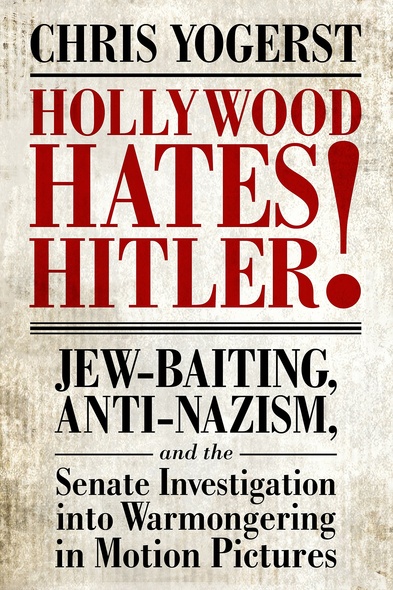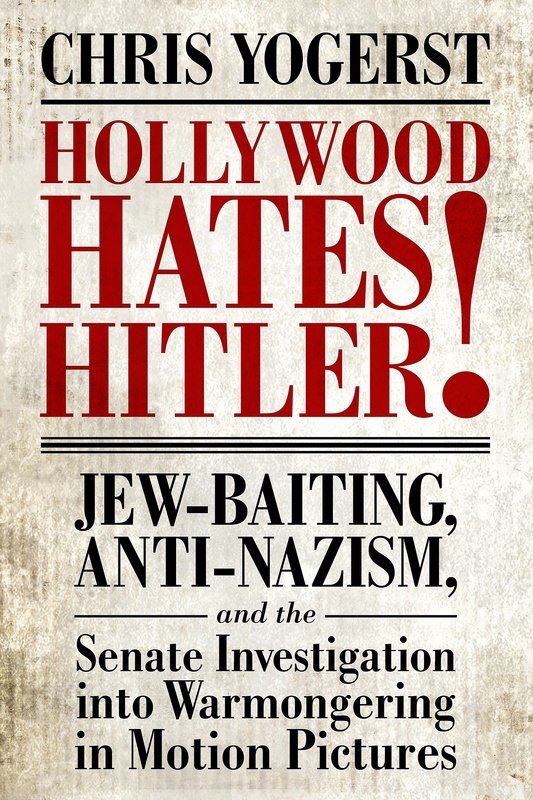
Hollywood Hates Hitler!
Jew-Baiting, Anti-Nazism, and the Senate Investigation into Warmongering in Motion Pictures
In September 1941, a handful of isolationist senators set out to tarnish Hollywood for warmongering. The United States was largely divided on the possibility of entering the European War, yet the immigrant moguls in Hollywood were acutely aware of the conditions in Europe. After Kristallnacht (the Night of Broken Glass), the gloves came off. Warner Bros. released the first directly anti-Nazi film in 1939 with Confessions of a Nazi Spy. Other studios followed with such films as The Mortal Storm (MGM), Man Hunt (Fox), The Man I Married (Fox), and The Great Dictator (United Artists). While these films represented a small percentage of Hollywood’s output, senators took aim at the Jews in Hollywood who were supposedly “agitating us for war” and launched an investigation that resulted in Senate Resolution 152. The resolution was aimed at both radio and movies that “have been extensively used for propaganda purposes designed to influence the public mind in the direction of participation in the European War.” When the Senate approved a subcommittee to investigate the intentions of these films, studio bosses were ready and willing to stand up against the government to defend their beloved industry. What followed was a complete embarrassment of the United States Senate and a large victory for Hollywood as well as freedom of speech.
Many works of American film history only skim the surface of the 1941 investigation of Hollywood. In Hollywood Hates Hitler! Jew-Baiting, Anti-Nazism, and the Senate Investigation into Warmongering in Motion Pictures, author Chris Yogerst examines the years leading up to and through the Senate Investigation into Motion Picture War Propaganda, detailing the isolationist senators’ relationship with the America First movement. Through his use of primary documents and lengthy congressional records, Yogerst paints a picture of the investigation’s daily events both on Capitol Hill and in the national press.
Hollywood Hates Hitler! densely packs facts, quotes, and references into its slim page count. . . . Yogerst’s research is impeccable, and his book is an important contribution to film history scholarship.
. . . Yogerst’s work to bring a fresh look to a forgotten moment in the relationship between the US government and the film industry and his well-executed look at the power of the press to impact political actions and congressional investigations.
Yogerst is right to deeply excavate this moment in history for further study, and his clear, engaging account of the often theatrical hearings makes Hollywood Hates Hitler! essential reading for film scholars and casual historians alike.
Here is fresh research on a fascinating period in Hollywood history, when Washington first clashed with movie studio chiefs who dared to question America’s isolationism. Yogerst has done his homework and provides a compelling narrative of events leading up to our involvement in World War II.
In 1941, mere months before Pearl Harbor, the US Senate charged Hollywood with the thought-and-image crime of producing anti-Nazi motion pictures. In Hollywood Hates Hitler!, the movie-minded cultural historian Chris Yogerst brings his sure authority and sharp insight to this fascinating and little-known political inquisition, staged in a congressional hearing room at a pivotal moment in American history. Yogerst provides an absorbing and illuminating account of the epochal face-off—and shows how the Washington senators, despite the home field advantage, were roundly trounced by the Hollywood moguls.
With impressive research matched by rare illustrations, Chris Yogerst sheds light on a little-known dark corner in US film history, the 1941 congressional attack on Hollywood that was whipped up by isolationists, anti-Semites, Red-baiters, and fascist sympathizers, with many nestled in the film colony itself. The politics mirror America at large and foreshadow the Hollywood blacklist.
Senator Nye’s ‘investigation’ has been neglected, and Chris Yogerst has made an absorbing tale out of it.
Chris Yogerst is assistant professor of communication in the Department of Arts and Humanities at the University of Wisconsin–Milwaukee. He is author of From the Headlines to Hollywood: The Birth and Boom of Warner Bros. His work has appeared in such publications as the Washington Post, Los Angeles Review of Books, Journal of American Culture, and Historical Journal of Film, Radio, and Television.





